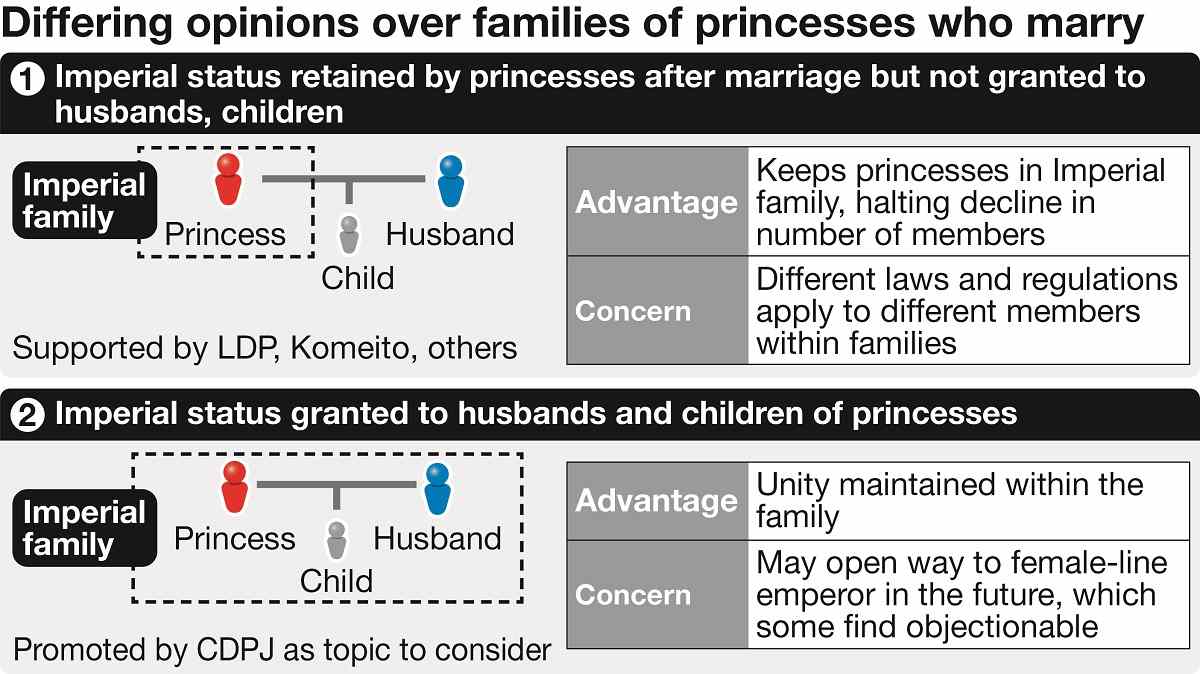Parties Say Japan’s Married Princesses Should Keep Status; No Agreement Reached on Status of Husbands, Children

A multiparty meeting to discuss the stable succession to the Imperial throne is held at the office of the House of Representatives speaker on May 23
6:00 JST, June 1, 2024
In discussions aimed at ensuring stable succession to the Imperial throne, the ruling and opposition parties are failing to agree on the status of the husbands and children of women who are Imperial princesses by birth. Initially, the parties were to discuss issues related to stable succession at a meeting once a week. However, since opinions among the parties differed far more widely than expected, it was decided at the second meeting held last week to change the style and let the House of Representatives speaker and the House of Councillors president listen to the views of each party and parliamentary group individually, in a bid to reach an eventual consensus.
The representatives of 13 parliamentary groups from the Liberal Democratic Party, the Constitutional Democratic Party of Japan and other parties attended the second meeting regarding stable succession in Tokyo on May 23. On the table were two questions: Whether female members of the Imperial family should retain their Imperial status after marriage, and whether male descendants of male lines of former Imperial family branches should be granted Imperial status.
At the meeting, the status of married princesses’ husbands and children became a major point of contention, although the parties basically agreed to the idea of female Imperial family members retaining their Imperial status after marriage, changing the current rule of princesses leaving the Imperial family when they marry members of the public.

Former Prime Minister Yoshihiko Noda of the CDPJ reiterated his stance that granting the husbands and children Imperial status should be considered. When he was the prime minister in 2011-12 in an administration by the now-defunct Democratic Party of Japan, he proposed the creation of female-line Imperial branches. He was thinking of men who marry into and children who are born into such branches when he made the proposal, because he values the unity of a family.
The LDP and Nippon Ishin (Japan Innovation Party) are concerned that granting Imperial status to those children could lead to the accession of a female-line emperor, meaning a person of the Imperial blood only on their maternal side, diverting from the long-held male-line tradition. On the other hand, it has also been argued that it is undesirable for a family unit to be divided in two, with one person being a member of an Imperial family while the others are ordinary members of the public.
At the meeting, parties also failed to reach agreement on limiting the topics of discussion for the time being to measures for securing a sufficient number of Imperial family members, while postponing the discussion on the system of future Imperial succession.
The CDPJ was one of the parties that had demanded simultaneous discussions of both issues.
“It is regrettable, but we’d have to leave the issue of Imperial succession for future discussion,” Noda told reporters, agreeing to postpone discussions on the topic.
The Japanese Communist Party, however, continues to oppose limiting the discussion to measures for securing a sufficient number of members of the Imperial family. The party is calling for allowing the throne to pass to a woman or to be inherited via a female line of the Imperial family.
“I’d like to fully exchange opinions with each party and parliamentary group, and process our thoughts as a legislative body,” said House of Representatives Speaker Fukushiro Nukaga at a press conference after the meeting, thereby withdrawing the plan to hold a multiparty meeting once a week.
The extent of the agreement the parties should aim to reach is likely to be another point of contention, as the current Diet session will close on June 23.
Top Articles in Society
-

Producer Behind Pop Group XG Arrested for Cocaine Possession
-

Man Infected with Measles Reportedly Dined at Restaurant in Tokyo Station
-

Woman with Measles Visited Hospital in Tokyo Multiple Times Before Being Diagnosed with Disease
-

Bus Carrying 40 Passengers Catches Fire on Chuo Expressway; All Evacuate Safely
-

Tokyo Skytree’s Elevator Stops, Trapping 20 People; All Rescued (Update 1)
JN ACCESS RANKING
-

Producer Behind Pop Group XG Arrested for Cocaine Possession
-

Japan PM Takaichi’s Cabinet Resigns en Masse
-

Man Infected with Measles Reportedly Dined at Restaurant in Tokyo Station
-

Israeli Ambassador to Japan Speaks about Japan’s Role in the Reconstruction of Gaza
-

Videos Plagiarized, Reposted with False Subtitles Claiming ‘Ryukyu Belongs to China’; Anti-China False Information Also Posted in Japan


























